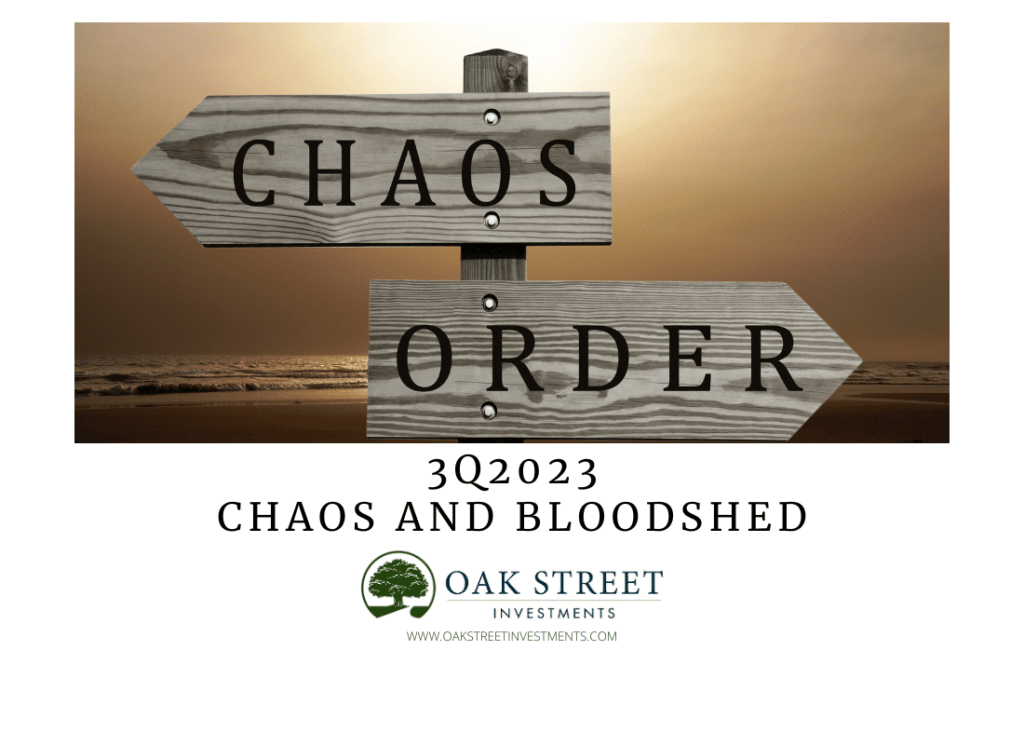
Chaos and Bloodshed
This newsletter has been more difficult to write than others, for numerous reasons. I like to keep my quarterly newsletters informative and lighthearted. While I recognize the weight and responsibility entrusted to me in managing money for people, those who know me also know there are few circumstances off limits to a joke when the opportunity presents itself (something every one of my teachers can attest to). But the terrorist attacks in Israel (and subsequent war) have made things…darker and more complicated.
As such, when it came time for a newsletter title, the first thing that came to mind was “Chaos and Bloodshed,” sung by Samuel Seabury in Hamilton as he tried to persuade others to avoid war with Britain. Yes, it applies to the suffering in Israel and Gaza, but also in Sudan, Ukraine, Afghanistan, Syria, and elsewhere. At times like this, as it did in the early days of the pandemic and countless other tragedies, it can seem trivial to discuss the economy and markets. For me though, as someone who finds great joy in reading and learning about the economy and the world, it’s provided a welcome respite amidst the geopolitical (and market) turbulence. So with that said, here’s your third quarter update!
Q3 Numbers
Global stocks and bonds struggled in the third quarter, with the Russell 3000 (US stocks) and US Aggregate bond index down over 3% and developed international markets off over 4%. Fortunately for investors maintaining a value tilt, the third quarter brought a return of the value premium, with global value stocks outperforming global growth stocks by almost 500 basis points (5%) – though notably, both were still negative.
Bond returns were also negative as interest rates continued to climb. For retirees and soon-to-be retirees, this presents a mixed bag. On one hand, they’re better off as their money can sit in banks, CDs, or Treasuries and actually earn a reasonable rate of interest (remember TINA – There is no alternative?) On the other hand, these investors tend to have higher allocations to bonds and have suffered losses in their bond portfolios on the way to these rates. This trend underscores the challenges that bond investors face in a rising interest rate environment, highlighting the need for prudent risk management and strategic portfolio adjustments.
Staying Disciplined
Remember that expected returns go up as markets go down, and trying to predict short-term market moves is a game of luck (read: gambling). Gambling can be fun, but it’s best done in Vegas, and it’s essential to know when you’re doing it!
Instead of allowing the media to control your investment strategy, try this: next time you read something online or in the news, or are swiping through social media and come across something you feel is definitely, positively, without a doubt going to impact the markets, think about your investment time horizon – when do you plan to withdraw from your investments? Then ask yourself how likely it is that this event will have a lasting impact beyond 5, 10 or 20 years.
Even retirees can use this: If you’re already retired and withdrawing from your money (or will be soon), you should have at least a few years of safe money (you do, right?), including cash, money markets, and tbills, so you aren’t forced to sell stocks (or bonds) when they’re significantly down. As I’ve written numerous times, it helps to view your cash and bonds as a different bucket/account or even portfolio, and not part of the same portfolio as your stock holdings. With this in mind, one of your buckets should focus on growth and have a sufficiently long time period that you can look at the event in question and, just as a younger investor with a long investment timeframe can, ask what, if any, impact the event may have based on the time horizon for that bucket.
I hope this newsletter finds you safe and healthy.
